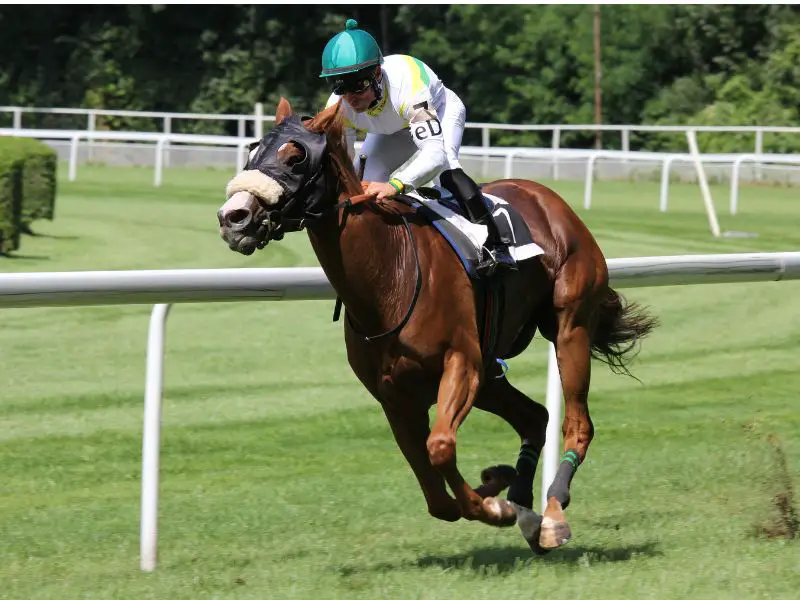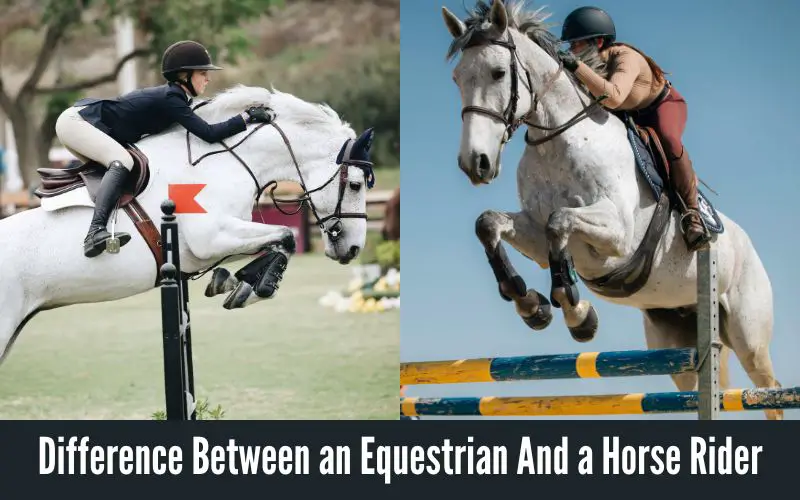An equestrian is a term used to identify a person who engages in horse riding activities, whereas a horse rider refers to someone who rides horses.
Understanding Equestrian Expertise
The difference between an equestrian and a horse rider lies in their level of expertise and training. Equestrians are individuals who have undergone comprehensive training in various aspects of horsemanship. They possess a deep understanding of the intricacies involved in riding and caring for horses.
Equestrians specialize in different disciplines within equestrianism, such as dressage, show jumping, eventing, or endurance riding. Each discipline requires specific skills and techniques, further enhancing their expertise.
Equestrians receive recognition in professional equestrian circles for their mastery of horsemanship. They are respected for their knowledge, experience, and dedication to their craft. This recognition opens doors to opportunities such as competing at high levels, coaching, or training horses professionally.
Read More: Origin of Equestrian
Horse Rider Basics Explained
Equestrians and horse riders both interact with horses, but the key difference lies in their levels of expertise. An equestrian is a skilled and experienced rider, while a horse rider refers to anyone who rides a horse, regardless of skill or experience. Both play important roles in the horse riding community.
The main difference between an equestrian and a horse rider lies in their level of expertise and commitment.
A general horse rider typically engages in horse riding as a recreational activity. Their primary focus is on enjoying the experience, building a connection with the horse, and improving their riding skills.

On the other hand, professional equestrianism is a more specialized and competitive field. Equestrians are highly skilled individuals who compete in various disciplines such as show jumping, dressage, or eventing.
They dedicate significant time and effort to training, honing their riding skills, and developing a deep understanding of horse behavior and performance.
Casual horse riding is often done for leisure and relaxation, allowing riders to connect with nature and experience the joy of being on horseback.
It can be enjoyed by people of all ages and levels of fitness. While it does require certain foundational skills and knowledge, it is generally more accessible to beginners and those seeking a less intense riding experience.
Delving Into The Equestrian World
Equestrian sports have gained popularity worldwide due to their thrilling nature and the close bond between a rider and their horse.
Let’s explore the equestrian world by discussing two main aspects: equestrian sports with Olympic involvement and the rigorous lifestyle of competitive equestrians.
Equestrian sports have historically been an integral part of the Olympic Games, showcasing the skill and versatility of both horse and rider. Competitions such as dressage, show jumping, and eventing require a harmonious partnership and teamwork between the equestrian and the horse. This level of involvement in the Olympics has significantly elevated the profile of equestrian sports.
Beyond the limelight of competitions, the life of a competitive equestrian encompasses a range of responsibilities that go beyond simply riding.
These individuals need to dedicate immense time and effort to the care and training of their horses, maintaining their fitness and well-being. They must also possess a deep understanding of horse behavior, nutrition, and veterinary care to ensure optimal performance.
In conclusion, being an equestrian is much more than just being a horse rider. It involves a commitment to excellence, a deep bond with the horse, and a rigorous lifestyle that demands both physical and mental dedication.
Equipment And Apparel Variance
Equestrians and horse riders both require specialized gear for their activities, but there are some notable differences in their equipment and apparel.
| Equestrians | Horse Riders |
|---|---|
| The attire typically includes a helmet, riding boots, and tight-fitting riding pants. | Casual riders may wear more relaxed clothing such as jeans and sneakers. |
| They often utilize specialized saddles, bridles, and other equipment designed for various equestrian disciplines. | Casual riders may use simpler gear like a basic saddle and bridle. |
In competitive equestrianism, proper attire is of significant importance. Dress codes are enforced to ensure a polished appearance and maintain a level playing field. Attire may vary depending on the discipline, but it typically includes a show coat, breeches, and a formal hat or helmet.
Overall, while casual horse riders may have more flexibility in their choice of attire and equipment, equestrians adhere to specific standards to ensure safety, functionality, and professionalism in their practice.
Assessing Skill Sets
Being an equestrian requires a unique set of skills compared to being a horse rider. While both involve riding horses, equestrians go beyond simply riding and possess a deeper understanding and connection with the horse. Required skills for being an equestrian include:
- Equine knowledge: Equestrians have a comprehensive understanding of horse behavior, anatomy, and care.
- Riding technique: They have refined riding skills and are adept at controlling and communicating with the horse.
- Connection with the horse: Equestrians establish a bond with the horse based on mutual trust and respect.
- Equestrian sports: They often engage in various disciplines such as dressage, show jumping, or eventing.
- Training: Equestrians undergo specialized training programs to develop their skills and knowledge.
Horse riders, on the other hand, may have basic riding skills without delving deeper into the equestrian world. The journey from being a horse rider to becoming an equestrian involves continuous learning, experience, and a passion for mastering the art of horsemanship.
Equestrianism As A Profession
Being an equestrian is more than just riding horses; it is a profession that requires dedication and commitment.
The business side of being an equestrian involves securing sponsorships and endorsements. These partnerships not only provide financial support but also help to build a brand and gain exposure.

Equestrians can pursue various careers within the industry. Some become professional riders, competing in prestigious events and earning prize money.
Others choose to train horses, working with clients to improve their riding skills. There are also opportunities in coaching, equine therapy, and sales.
However, becoming a professional equestrian requires a significant level of commitment. It involves dedicating time and energy to training, competing, and taking care of horses.
The physical demands can be challenging, as riders need to stay fit and in tune with their equine partners.
Additionally, equestrians must be willing to travel extensively, often spending extended periods away from home.
Community And Culture
The equestrian community encompasses a diverse range of individuals who share a passion for horses and riding. Within this community, various subcultures have emerged, each with its own unique practices and traditions.
These subcultures can be categorized based on different equestrian disciplines, such as dressage, show jumping, or western riding.
Moreover, they create a strong sense of community and belonging for horse riders. Horse riders play a vital role in shaping and maintaining the broader equestrian culture.
Their dedication, skill, and love for horses contribute to the growth and development of various equestrian activities, events, and organizations.
The Equestrian’s Impact On The Horse
Equestrians, also known as horse riders, have a significant impact on their horses through their training techniques and the bond that they develop with their equine partners.
An essential aspect of being an equestrian is understanding the care and management of horses by professionals.
Training techniques for equestrian horses involve a combination of methods such as groundwork, lunging, and riding exercises, all designed to enhance the horse’s physical abilities, balance, and response to commands.
By using positive reinforcement and consistent training, equestrians can help horses become disciplined, well-rounded athletes.
The bond between an equestrian and their horse plays a crucial role in their success as a team. This bond is built over time through trust, respect, and communication.
Equestrians develop a deep understanding of their horse’s body language and individual needs, enabling them to provide appropriate care and support.
| Training Techniques | Bond between Equestrians and Horses | Care and Management of Horses |
|---|---|---|
| Groundwork | Trust and Respect | Feeding and Nutrition |
| Lunging | Communication | Grooming and Hygiene |
| Riding Exercises | Body Language | Healthcare and Veterinary Support |
The equestrian’s impact on the horse is profound, shaping their physical abilities, behavior, and overall well-being. Through effective training techniques, a strong bond, and proper care and management, equestrians ensure the development of healthy and successful equine partners.
Legal And Ethical Considerations
Animal welfare is a critical concern in equestrianism and casual riding. The regulations governing professional equestrian sports ensure that proper care and treatment of horses is maintained.
It includes guidelines for training, transportation, and competition conditions, to safeguard the welfare of the animals involved. Ethical practices in the equestrian industry further reinforce this commitment, with organizations promoting responsible horse ownership, horsemanship, and training techniques that prioritize the well-being of the horse.
Riding for leisure or casual purposes may not be subjected to the same stringent regulations, but individuals should still adhere to ethical standards.
Basic knowledge of horse behavior, proper tack and equipment use, and understanding the physical and mental needs of the horse are important for any rider, regardless of their level of expertise or involvement in competitive equestrianism.
What Is A Professional Horse Rider Called?
A professional horse rider is commonly known as an equestrian. Equestrians compete in various disciplines such as dressage, show jumping, and eventing. They train and care for horses to achieve optimal performance in competitions.
What Does It Mean To Be A Horse Rider?
Being a horse rider means having the ability and skill to confidently control and guide a horse. Riders develop a strong bond with their equine partners and engage in various equestrian activities such as racing, jumping, or simply enjoying a leisurely ride.
What Is A Beginner Horse Rider Called?
A beginner horse rider is commonly known as a novice rider. They are new to horseback riding and are still developing their skills.
What’s The Difference Between Horse And Equine?
A horse is a specific type of equine, while equine is a broader term that includes horses, donkeys, and zebras.
Final Thoughts
To summarize, the terms “equestrian” and “horse rider” may sometimes be used interchangeably, but they have distinct meanings. While a horse rider is someone who simply rides a horse, an equestrian is a person devoted to the art of horsemanship and encompasses various disciplines.
Understanding this difference can help in appreciating the dedication, skill, and passion involved in the equestrian world. Whether you’re a horse rider or an equestrian, both share a love for horses and the connection they bring. So, saddle up and explore the incredible world of horses!






